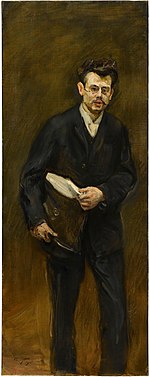About Eduard Fuchs
- Eduard Fuchs (31 January 1870, Göppingen – 26 January 1940, Paris) was a German Marxist scholar of culture and history, writer, art collector, and political activist. Fuchs' father was a shopkeeper.
- Early in his life, the younger Fuchs developed socialist and Marxist political convictions.
- In 1886, he joined the outlawed political party Sozialistische Arbeiterpartei (the precursor of the modern SPD, Sozialdemokratische Partei Deutschlands).
- Fuchs received a doctor of law degree and practiced as an attorney.
- In 1892, he became editor-in-chief of the satiric weekly Süddeutscher Postillon and later co-editor of the Leipziger Volkszeitung.
- His inflammatory articles in newspapers—one accusing the Kaiser of being a mass murderer—resulted in periodic jail sentences.
- During his periods of confinement, Fuchs wrote various social histories utilizing images as one of his primary sources.
- The first of these was his Karikatur der europäischen Völker (Caricatures of European Peoples), 1902. He moved to Berlin that same year where he edited the socialist newspaper Vorwärts.
- The following year he began his magnum opus, an examination of moral practice, Sittengeschichte, eventually running to six volumes by 1912.
- While engaged in this series, he followed up his interest in caricatures with one devoted to the representation of women, Die Frau in der Karikatur, 1905 (3 vols).
- Another book documenting the stereotypical representations of Jews appeared in 1912.
- Fuchs traveled with the artist Max Slevogt to Egypt in 1914, shortly before the outbreak of World War I.
- He was a pacifist during the War.
- Lenin's government put him in charge of prisoner exchange with Germany after the war; he was among the leaders of the German Comintern in Berlin in 1919.
- His interest in societal concerns in caricature led to a research interest in Daumier.
- Beginning in 1920, Fuchs published a catalogue raisonné on the artist in three volumes.
- He resigned from the party in 1929, following the expulsion of several stalwarts.
- At Hitler's ascension to power in Germany in 1933, Fuchs moved to France.
Read more at Wikipedia
See Also
- Famous People's Birthdays on 31 January, Germany
- Famous People's Birthdays in January, Germany
- Famous historian's Birthdays on 31 January, Germany
- Famous historian's Birthdays in January, Germany
- Famous art historian's Birthdays on 31 January, Germany
- Famous art historian's Birthdays in January, Germany
- Famous journalist's Birthdays on 31 January, Germany
- Famous journalist's Birthdays in January, Germany
- Famous art collector's Birthdays on 31 January, Germany
- Famous art collector's Birthdays in January, Germany
- Famous cultural historian's Birthdays on 31 January, Germany
- Famous cultural historian's Birthdays in January, Germany


 Date of Birth:
Date of Birth:  Place of Birth: Göppingen, Baden-Württemberg, Germany
Place of Birth: Göppingen, Baden-Württemberg, Germany
